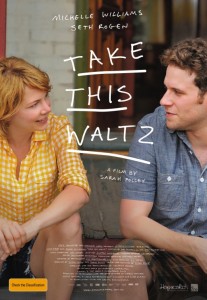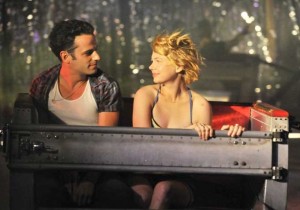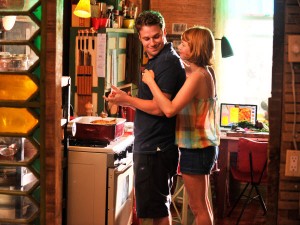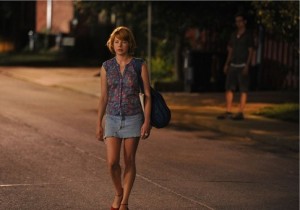
There is something deeply unsettling about life.
We all feel it. It’s the sense that something is missing, that the pieces don’t quite fit together like we think they should; the feeling gnawing at the depths of our being that this, whatever this is, isn’t quite right.
We do our best to paper over it with activities, social media, hobbies, anything and everything to distract ourselves from the drip … drip … drip … trying to alert to this gaping void. We keep busy yes, but we’re aware of it. Acutely aware it. But most of choose to say nothing about it, staying silent in the face of a gaping void of being so large it terrifies us.
Not so Margot (Michelle Williams) a softly spoken married brochure writer (and frustrated novelist) for Parks Canada who articulates this very fear when she finds herself seated in the same row of seats as a handsome stranger, Daniel (Luke Kirby) on a flight back from an assignment. Initially irrationally angered by him, she finds herself increasingly fascinated, against her will, by the promise he holds of, if not filling, at least soothing the ache she feels inside.

She freely admits to him early on that “I fear being afraid”, saying words to the effect that she hates the bits of life that lie in between the start and the finish. Scared of what this gap between what was, and what will be could hold, she does her best to be in a position where those uncertain places don’t have a substantial foothold in her life.
But once she admits to herself that something is wrong, that there is a gnawing fear inside of her that her life isn’t quite what it should be, she can’t turn back, and suddenly all of the unfinished, or not quite well put together pieces of her life start to slowly unravel to life-changing effect.
It takes her some time, in this beautifully slow moving film by Canadian Sarah Polley whose pace mirrors the stops and the starts, the slow back and forth of wrestling with a dilemma, and the decision making that must inevitably flow from it, to make her peace with the changes that Daniel brings to bear.
It is able to happen at such a rhythmic unhurried pace because Daniel lives nearby – in fact to her initial horror, just a few houses down the street – so she is able to see him whenever she needs to, and because both she and her husband, Lou, in a surprisingly nuance performance by Seth Rogen, whose writing a chicken cookbook, both work from home.

Their lives have a flexibility unknown to those long lost in the corporate rat race, allowing them to spend time together mouthing conversations through the glass, playfully concocting ways in which they would kill each other, and displaying the sort of affection that only those in a long held relationship, with its well worn patterns of behaviour, are familiar with.
It seems like a happy relationship, adorned as it is with countless small rituals and in-jokes, an intimacy borne of constant sure companionship. But that is the problem, as Margot must slowly admit to herself. They have become hostage to the comforting ebbs and flows of the relationship to the extent that the relationship almost runs on auto pilot, with much left unsaid (in contrast to her budding friendship with Daniel which displays an almost alien, to Margot at least, unflinching honesty and willingness to tackle the big emotional questions of life). Her attempts to jolt their relationship back to life are met with indifference, surprise and sometimes anger by Lou, who doesn’t think there is anything wrong.
One of things that sets this film apart from other movies which attempt to dissect what it takes to stay in love, and if that is even possible, is that Lou isn’t painted as a fatally flawed character, while Daniel, with whom Margot has a fascination she has trouble articulating, is not presented as an emotional knight in shining armour, come on his gleaming white stead to rescue her from a life of near-fatal ennui.
Even Margot herself is not painted as anything other than someone who is as suspectible as the rest of us to lying to herself, being frighteningly honest with herself, and fully capable of making both good and bad decisions.

The film doesn’t always succeed in its noble ambition to show the difficulties of living life in the great gaps in between, being a bit ham-fisted at times in its attempts to make a point. (Although when it does, it is exceptionally good; such as when Margot is showering at the pool and the somewhat naive conversation she is having with her twenty something sister-in-law and friend collides with the depth of wisdom voiced by the considerably older women talking nearby.) Such as when it has become obvious there are fault lines running through Lou and Margot’s relationship, at which point a report comes on the TV that an earthquake has shaken the Toronto area.
Or when Margot and Daniel are out for the day together and strapped into a whirlygig carnival ride inside a building festooned with tinsel, bright flashing lights and the pounding sound of “Video Killed the Radio Star”, and it s obvious, too obvious, that something is happening between them.
But for the most part, it does manage to display, with aching accuracy, and graceful subtlety (helped along by a delightfully lo-fi soundtrack) the often brutal, and many times poignant, rise and fall of relationships, thanks largely to a clever screenplay, and another perfectly nuanced performance by the profoundly talented Michelle Williams, who has never made baking look so comfortingly domestic, and dreadfully sad all at once.
It is also not afraid of tackling the horrible complexities of life, which don’t allow for easy answers especially to what lies in the terrifying parts in between …